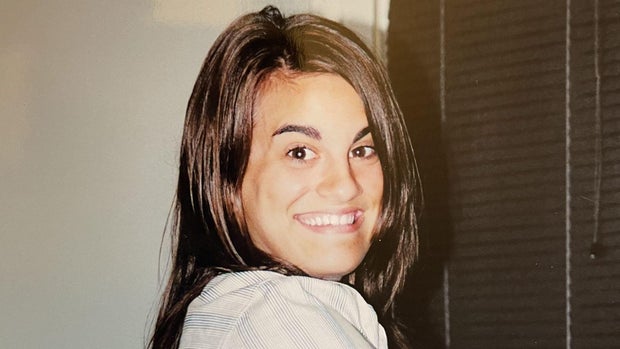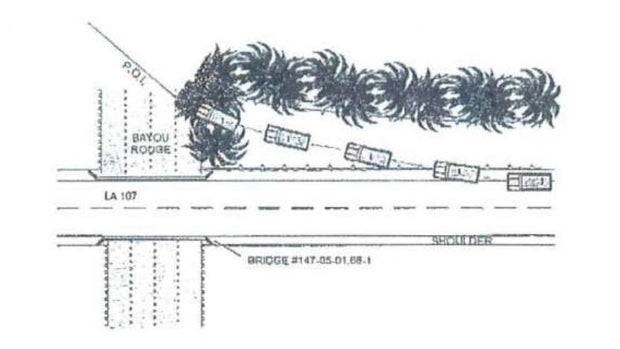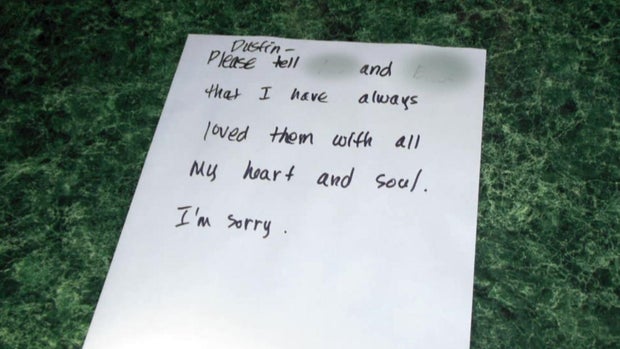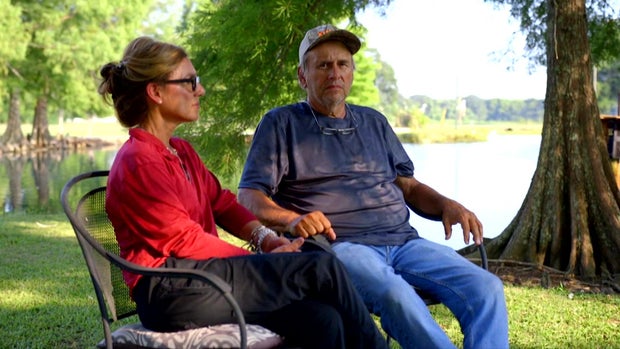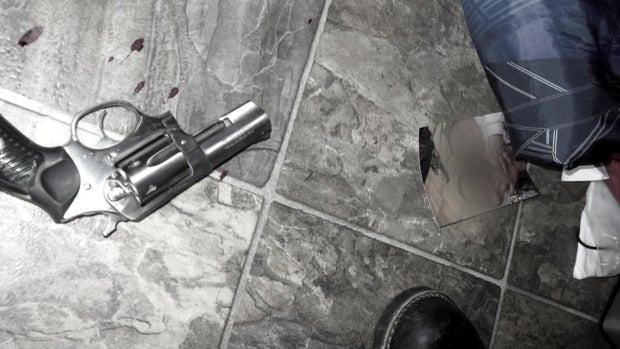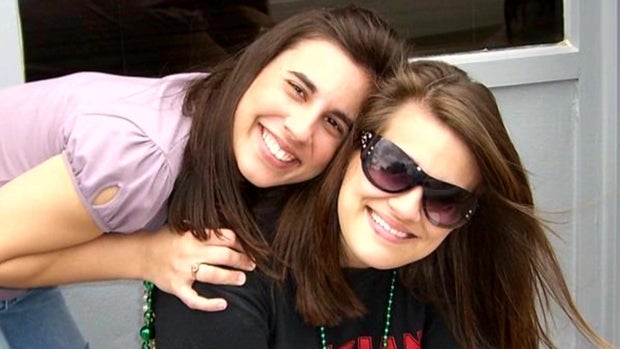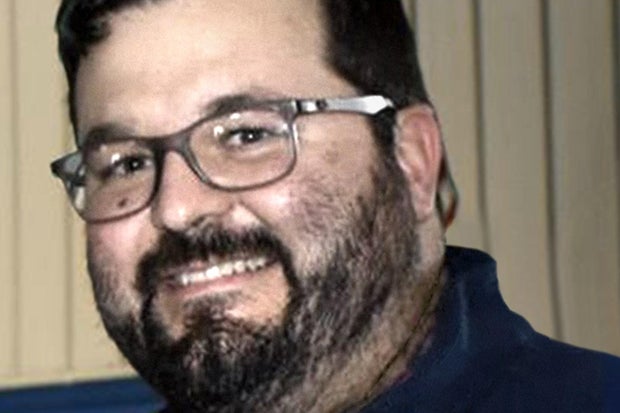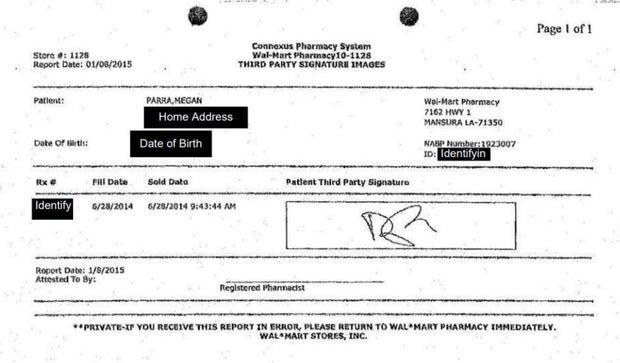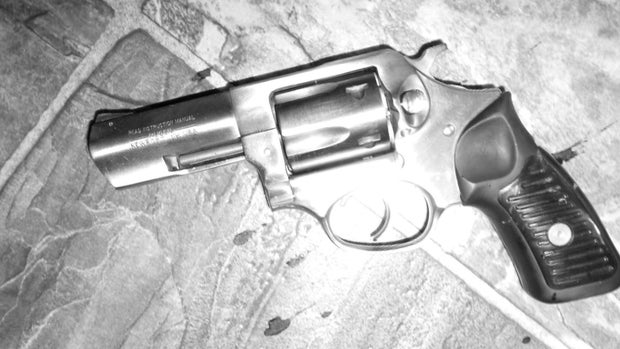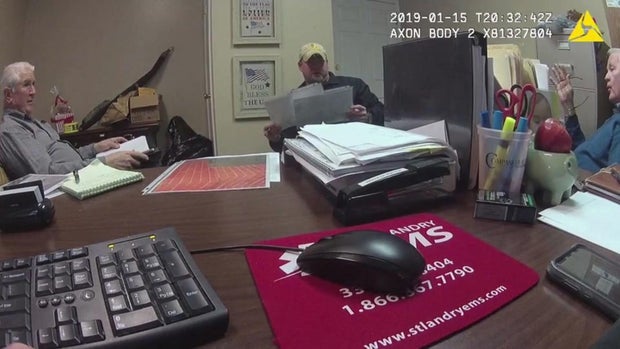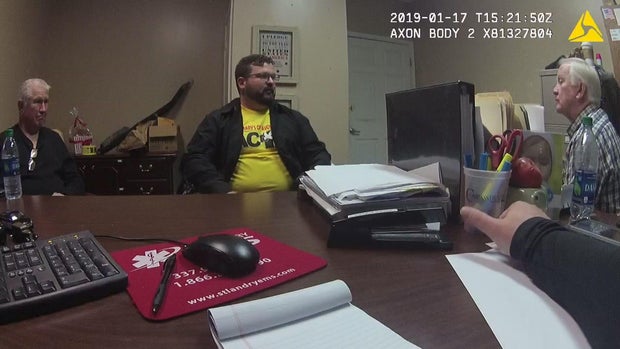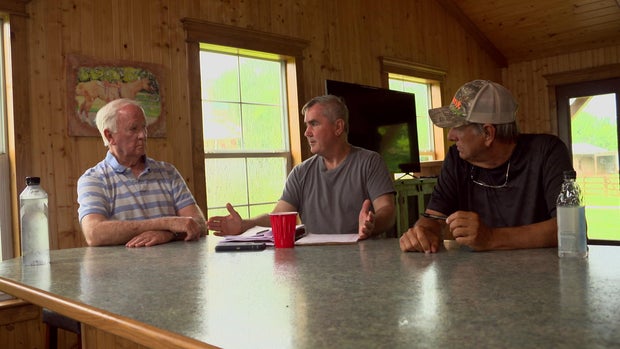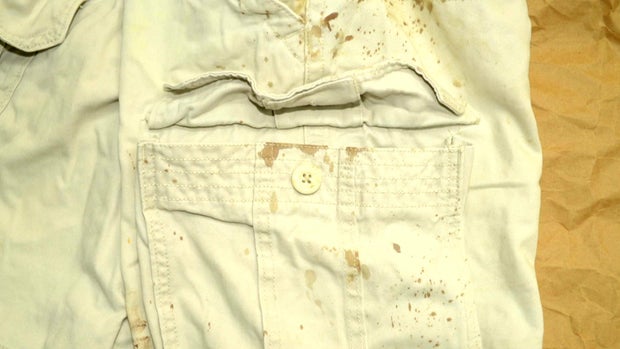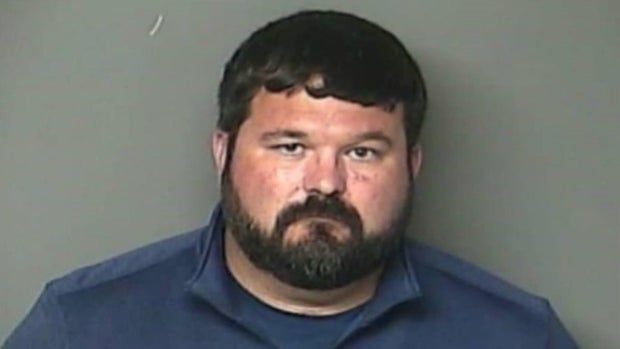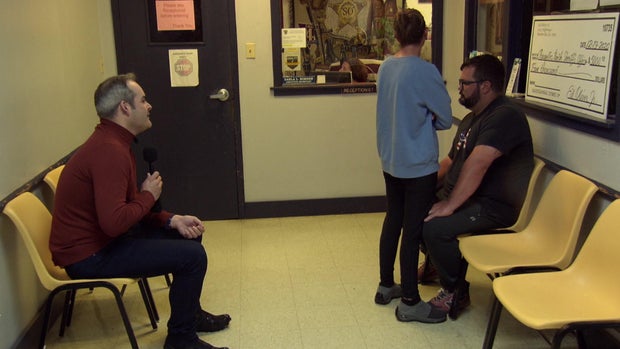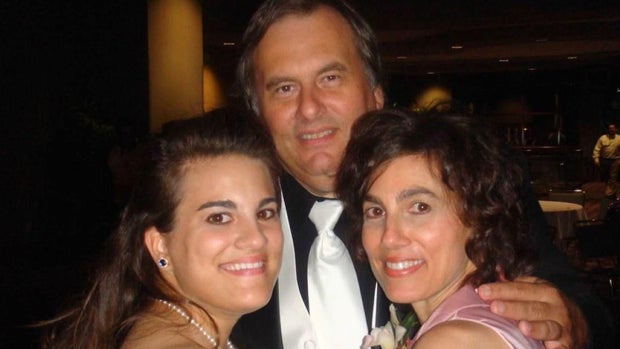CBS News
48 Hours: Will Heather DeWild’s killer get away with murder?

Produced by Lisa Freed
[This story first aired on Nov. 18, 2103. It was updated on June 14, 2014]
Dave Springer drives the same route he did on July 24, 2003 — the day the retired Denver cop was in a frantic search for his own daughter.
“This is basically the route I took, in the evening to come over here and look for her,” Springer tells “48 Hours” correspondent Erin Moriarty as they drive. “And I was looking between the houses.”
“When you were just driving around, what were you hoping you’d see?” Moriarty asked.
“Well … maybe I would see my daughter’s car moving, see her somewhere,” he replied.
Heather DeWild, 30, thought she’d be safe going to her soon-to-be ex-husband’s house, in Edgewater, Colorado … if she took along her two children, Jacob and Hannah. She planned to just stop by to pick up insurance cards for the kids and sign a check.
“I told her not to go there,” Springer said. “And I didn’t think she would. But she did.”
And then she vanished.
“As you’re driving around, do you have a sinking feeling?” Moriarty asked Springer.
“Yeah, I … really had a bad, bad feeling about it,” he replied.
Springer says, he’d been worried what his son-in-law, Dan DeWild, might do as the final divorce approached.
“Basically he wanted to keep things under control, his control, and that was slipping away from him and I think it just seemed like he was getting more and more desperate, more and more hostile,” he told Moriarty.
So when Heather didn’t return after going to Dan’s house, her anxious mother, Carol Springer, thought the worst and called Dan.
“He told me she went shopping, and I says, ‘Well, that’s not true.’ That’s what I told him. I says, “No. That’s not true.”
“We knew immediately that was a lie,” Dave Springer told Moriarty. Why? “‘Cause she, before she left the house … She didn’t take any money with her or credit card.”
“And he said she went shopping?” Moriarty said. “How much sense did that make to you?
“Well it didn’t make any sense,” Springer replied.
And Heather would never leave her children behind, even with their dad, says her sister, Rebecca Barger.
“There’s no way she would leave without her kids. No way,” Barger said. “I just instantly knew – he did something to her.”
“You were sure it was Dan,” Moriarty noted. Barger nodded yes.
Heather’s mother rushed over to Dan’s house pick up her grandchildren.
“And what was going through your mind at that point?” Moriarty asked.
“Let me get the kids and be gone. I wanted to get outta there,” Carole replied.
The kids, only 3 and 5 years old, couldn’t say where their mother had gone. Local police stopped at Dan’s house and looked around, but didn’t find anything suspicious. But Heather’s father, the veteran cop was convinced something terrible had happened.
The next morning, Mark Crider, a detective with the Denver Police Department, was pulled in to assist the Edgewater Police. Heather was now officially a missing person.
“Dave was obviously — extremely concerned,” Crider said. “It was — a little unusual because it was a Denver police officer’s daughter who was missing. … And that … does personalize it a little.”
Crider learned that after a rocky six- year marriage, Heather and Dan DeWild were just days from finalizing their divorce.
“I had learned that the divorce was getting a little nasty,” said Crider.
And that Dan was upset when Heather was awarded temporary custody of Jacob and Hannah and he was ordered to pay child support.
“He was very angry over that. Because he thought he was gonna lose his home. He couldn’t pay all his bills,” said Springer.
That’s when Dan’s identical twin brother David came to the rescue by moving in, along with his girlfriend, Roseanne, to help Dan pay the bills.
Born a minute-and-a-half apart, Dan and David were inseparable — even working as mechanics for the transit authority.
So the first stop for Crider was the DeWild’s house. Heather’s husband, Dan, answered the door.
“Quickly into our conversation he mentioned that he had an attorney, which I thought was a little odd,” Crider explained standing outside the DeWild house. “… and his attorney told him, that he shouldn’t talk to the police. … What lights in my mind is, ‘Well, why do you have an attorney? This is a missing persons. We’re trying to help you find your wife.'”
And when David DeWild pulled into the driveway, Dan made sure his twin brother didn’t talk to the police either.
“Dan walks over as if to physically grab his brother. And as he’s walking over, he’s yelling for him not to talk, he doesn’t have to talk – to get inside,” Crider explained. “I’m thinking now we don’t have a missing person, we have a murder.”
But without the DeWilds’ cooperation, Crider couldn’t search their house. By the time police got a warrant, Heather had been missing for six days.
Inside the home, Crider said there was no sign of a murder weapon, blood or any sign that Heather had been there or killed there. But investigators soon learned that David was taking his suburban 15 miles away to be repaired.
“Why? Here he’s — he’s a mechanic … his brother’s a mechanic,” Crider said. “Did it pique my interest? Absolutely.”
Investigators wanted to check out the vehicle. They were looking for “some form of decomposing human scent,” said Deputy Sheriff Al Nelson. “In other words, had there been a body in there.”
Nelson and his dogs searched the Suburban.
“They hit on the rear, and I believe it would be the driver’s side rear door area,” said Nelson.
“And that’s the first hint that maybe Heather’s body had been in there,” Moriarty noted.
“Something had been in there, right,” Nelson affirmed.
Crider’s next step was to confront David DeWild.
“We said, ‘Da– there’s a decomposing body in your vehicle.’ And he talked around things and he talked around things. And at one point we put it to him directly and said, ‘Did you kill Heather?'” Crider said. “His head’s kinda down. He’s a little emotional. He says he needs to talk to an attorney. And he walked into his house.”
Crider now believed that both brothers had killed Heather. What convinced him even more, was when one day later, David suddenly married his longtime girlfriend, Roseanne.
“Suddenly, you know, Dave says to you, ‘Let’s get married,'” Moriarty commented to Roseanne. “Doesn’t that seem strange?”
“At the time, it didn’t,” she replied. “You know I had been hounding him … And then Heather went missing and it wasn’t a happy time so we didn’t do that and so I griped a lot you know … And then all of a sudden, you know, it’s like, ‘Well, let’s go get married then.’ So it — it didn’t — it didn’t seem strange at all, no.”
“It never occurred to you he might be thinking, ‘Well, she won’t be able to talk to the cops, she won’t be able to testify against me if I marry her,'” Moriarty asked Roseanne.
“No, I — I don’t know the law,” she replied.
Two weeks after Heather disappeared, her car was found at an apartment complex five miles from the DeWild home. But there was no sign of Heather.
Crime lab investigators searched the white, four-door Nissan Sentra, but found nothing helpful inside.
“Each and every hour it’s out in the environment, in the elements we lose a little bit more evidence,” said Crider.
“When the car was found, did that make things worse?” Moriarty asked Springer.
“Worse, yeah. That was a major breakdown for me. Right there,” he replied.
Asked why, Springer said, “You knew at that point for sure she was gone.”
One month later, Curtis Johnson was moving dirt on a canyon road when he uncovered Heather’s body.
“Basically the body would have been on that side right there,” Johnson pointed towards a mound of dirt. “This is where the body would have been setting.”
Her death was ruled a homicide. But her body was so decomposed, the cause of death was undetermined. And investigators still didn’t have enough evidence to arrest either of the brothers.
“I mean — and let’s be honest, detective — it really does look like they’re gonna get away with this,” said Moriarty.
“Oh, absolutely,” Crider agreed.
A NEW LOOK AT THE CASE
The Springer family couldn’t understand why police were dragging their feet in arresting the primary suspect in Heather’s death: her husband, Dan DeWild.
“The police were saying that they were doing what they could. They were looking into it,” Heather’s sister, Rebecca Barger said. “After a while, you just think … is anything ever gonna happen?”
“Here you are a member of the Denver Police Department. But, how much were you allowed to know about the investigation into your – ” Moriarty asked Dave Springer.
“Absolutely nothing,” Heather’s father replied. “… at times, I would think, ‘Well, they’re really not doing anything.’ They’re just telling me they’re doing something and they’re just letting it slide.”
“You do start to lose hope. But you try to stay in there. I did,” said Carole Springer.
Their prayers were answered in 2005, nearly two years after Heather’s murder, when Scott Storey became Jefferson County’s new district attorney.
“They just poured their hearts out about how frustrated they were. How they yearned for justice for Heather,” said Storey, who promised to reopen the investigation.
“When you made that promise did you realize what you were getting yourself into? Did you have any idea?” Moriarty asked Storey.
“Not entirely,” he replied.
Storey assembled a task force and put investigator Russ Boatright in charge.
“What was it that drove you, drove all of you, to try to get this case solved?” Moriarty asked Boatright.
“Just at first blush, I think you knew what — what the case was. And it just — it seemed solvable. It seemed like it was right there at your fingertips,” he replied.
Investigators combed through 1,500 pages of reports and retested all the forensic evidence with no luck.
“I don’t even know how many times we went back through things and double checked things,” Boatright said. “We had no DNA. We really had no physical evidence.”
Not that DNA would have helped. Remember, Dan and Dave DeWild are identical twins.
“They could have the same DNA,” Storey explained.
“So if we had found, you know, one of the DeWilds’ hairs in that car, that was not going to be the smoking gun piece of evidence,” added Boatright.
Along with the brothers, the prosecution team was also convinced that Roseanne, who was living in the house, had to be involved.
“We really believed that — that she had to know what went on. She couldn’t just be in that house … she just couldn’t be totally ignorant of what — what happened,” said Storey.
There was that suspiciously timed marriage to David.
“It was the day after David is confronted on the front porch and told that the cadaver dog hit on — on his Suburban,” said Boatright.
And what Russ Boatright says Roseanne told others was the real reason they tied the knot.
“She had made the statement — she had to marry him so she couldn’t testify against him. And I really — I don’t know what else that means other than what it sounds like it means,” said Boatright.
“I mean, it sounds incriminating,” Moriarty noted. “Yes,” Boatright agreed.
Incriminating or not, investigators still didn’t have enough evidence to arrest any of the DeWilds. As the years passed, David Springer’s frustration and anger grew.
“I would be screaming angry at times,” he told Moriarty.
After pleadings from the family, in 2009 — six years after Heather was murdered — Russ Boatright was assigned to the case full time.
“And that really was the turning point,” said Storey.
The files would grow to 30,000 pages, filling more than 15 boxes, as Boatright and his team methodically built a circumstantial case piece by piece.
Clearly, the killer or killers had been careful. Heather’s car was so clean, there was no evidence that she had ever been in it.
“We didn’t find any evidence of Heather’s DNA being present inside or outside the vehicle. Nor did we find any fingerprints — or anything else to indicate that — that Heather used that vehicle,” Boatright explained.
What he did have was a DVD copy of a videotape police recovered from the residence — a sex tape that Dan and Heather made years earlier, showing Dan’s fascination with bondage and ropes.
“What we end up seeing in this videotape — are images of Daniel tying Heather up in a very similar manner to how she was found,” said Boatright.
And there was another discovery.
“What we have here is Daniel’s — dating profile from an online dating service,” Boatright told Moriarty. “… he described himself as a widow/widower.”
The trouble is Heather’s body had not been found yet.
“What did that say?” Moriarty asked Boatright.
“Well, that said he probably knew he was a widower at that point,” he replied.
While the pieces of the puzzle clearly pointed at the DeWilds, prosecutor Robert Weiner, who had been assigned to the case, still couldn’t answer some important questions.
“We didn’t know how she died. And you know, the autopsy report didn’t say how she died. We don’t know–” said Weiner.
“You don’t even know where she died,” Moriarty noted.
“No,” said Weiner.
“You don’t know exactly who killed her,” said Moriarty.
“We didn’t,” said Weiner.
But when Weiner took what evidence he had to a grand jury, he got an indictment.
Jefferson County DAs office
On Dec. 14, 2011, more than eight years after Heather’s body was found on that canyon road, Dan, David and Roseanne DeWild were finally arrested for her murder.
“You still have — a pretty weak case,” Moriarty pointed out. “I mean, you have enough to indict these three. But now you’ve got to prove these three.”
“Right,” Weiner said. “And that was kinda my — my thought is, ‘Now the work begins.'”
Dan’s attorneys, Tom Ward and Fran Simonete, were feeling very confident as they prepared for trial.
“Was there any physical evidence that tied Dan to the death of his wife?” Moriarty asked Ward.
“Not a shred. None,” he replied.
Until they were hit with a bombshell.
“And how did that change the case for the two of you?” Moriarty asked.
“It completely flipped it upside down,” said Ward.
THE BOMBSHELL
As prosecutors prepared for trial, District Attorney Scott Storey worried about their purely circumstantial case.
“In today’s world–with … the ‘CSI’ shows and those kinds of shows … jurors want more than just circumstantial evidence,” Storey explained.
Their best hope was to somehow get one of the DeWilds to turn on the others. Investigators say it was just a matter of finding the weakest link.
“Did you think Roseanne was going to turn against her husband and her brother-in-law?” Moriarty asked investigator Russ Boatright.
“I thought there was a possibility Roseanne would,” he replied.
“And did she?” Moriarty asked.
“No,” said Boatright.
Instead, in a stunning turn of events, it was Roseanne’s husband, David, who suddenly broke down. Nine years after Heather was killed, David DeWild admitted that he hid her body after his twin brother, Dan, killed her.
“I just fell to pieces,” said Roseanne. She claims that until that moment, she never guessed the two brothers were involved in Heather’s death.
“It’s hard to explain my feeling — denial. No. … it’s not true,” she told Moriarty, shaking her head. “But it was true.”
With David finally ready to talk, it fell to Russ Boatright to uncover all the details.
According to David, Dan began planning Heather’s death in April 2003, after he was ordered to pay child support.
“And that’s when I started to realize that this was actually a well thought out plan,” said Boatright.
“Why would David go through with this and help his brother?” Moriarty asked.
“I think David — describes it as, ‘I’m tryin’ to talk him out of it most of the time,'” Boatright replied. “But he said when — Daniel told him, ‘Look, I’m doin’ this with you or without you,’ he said at that point he made a decision to help his brother. … He said he knew if his brother did this on his own he would get caught.”
On Aug. 4, 2012, a clean shaven David DeWild agreed to take investigators back to the scene of the crime — the DeWild’s garage — to show exactly where and how Heather was killed. It was all videotaped.
“You could tell it impacted him, you could tell he was upset going back in there again,” said Boatright.
A warning: some of what David tells Boatright is disturbing.
According to the plan, Heather and the kids arrived at noon on July 24, 2003. As Dan went to meet them, David says he tried to stop his brother.
David DeWild on video: And I – I stop him right when he’s walking up — and I’m in his way — and I say, “Dan, don’t f—–‘ do this.” … but he was very calm.
As the children played in the house, Heather followed husband Dan into the garage. Prosecutor Robert Weiner believes Dan lured her there with a promise to return the sex tape the couple had made.
“He knew he had to use something to get her into that garage. And that was that tape. ‘Cause she wanted that tape back,” he explained.
David DeWild on video: The door opens. Heather walks through. And she says, “What did you want to show me out here?” And my brother walks through, closes the door, grabs her by, like both shoulders, throws her down hard and she … It just hit her like – like Pearl Harbor. She didn’t know what’s gonna happen. … And … she goes to get up like this. And she looks at me and I look at her.
At that moment, David could have stopped Heather’s murder, but he didn’t.
“She knew something was going to happen, was about to happen and kind of looked to him to say, you know, ‘Help me here.’ And he said, ‘I didn’t do anything. I didn’t do a thing to help her,'” said Boatright.
David DeWild on video: And he takes a mallet off the counter and it’s – she’s trying to get back up. Boom. Whacks. She drops.
He tosses the hammer down. He takes his noose, puts it around her neck.
Dan then hanged Heather from the rafters.
David DeWild on video: I guess cinches it up. Comes over and pulls on the rope.
“My jaw dropped. ‘Are you kidding me?'” Weiner said. “At that point, he began to stage her body by — tying her and making it attempt to look like it was — some type of bondage sex act gone bad. … Daniel proceeds to place her body in trash bags.”
As Heather’s children continued to play elsewhere in the house, David abandoned Heather’s car at the apartment complex parking lot.
By the time David returned, Dan had already placed his wife’s body in the back of the Suburban.
David DeWild on video: I just — just make sure she’s not breathing or anything, you know? I just — I put my hand on her I — is what I remember.
As David tells it, the brothers were bound by their terrible secret and he revealed how he and Dan managed to erase all evidence of Heather’s brutal murder.
“They were watching crime shows — the “CSI”-type shows, any — any crime shows that they could watch and learn,” Weiner explained. “So they double-gloved. They had two sets of gloves on, ’cause they didn’t wanna leave any trace evidence. They didn’t wanna leave blood.”
And Heather’s body might never have been found if David had made it to a pre-planned burial site. Instead, transmission problems with his Suburban forced him to hide her along that canyon road where Curtis Johnson discovered her.
The prosecution believed they finally knew how Heather had been killed, but could they trust David?
“I mean David’s lied for nine years,” Boatright told Moriarty. “He is a liar. And he’s certainly capable of lying.”
So before they gave him a deal, David had to pass a polygraph.
“He passed on the issues as far as killing Heather,” said Boatright.
“But were there some areas that he failed or were…” Moriarty pointed out.
“… he had some issues on some other questions,” Boatright said. “Primarily the involvement of others.”
“On the issue of Roseanne?”
“Yes,” said the investigator.
But Roseanne will not go on trial after all. Although prosecutors maintain she was not part of any deal, after spending more than eight months in jail, all charges against her were dismissed for lack of evidence.
Asked if he has any regret about putting Roseanne in jail for eight months, Story told Moriarty, “Oh, no. … I was – very — confident that — after the fact that she had some knowledge and that — very likely she had some participation of one degree or another. We just couldn’t prove beyond a reasonable doubt.”
It’s hard to believe that a woman who was in the house when Heather was killed and was married to one of the killers would know nothing or see nothing, but that’s exactly what Roseanne says.
“Roseanne, did you have anything to do with Heather’s death — and her disappearance,” Moriarty asked.
“I did not,” she replied. “I did not. I had nothin’ to do with it. I didn’t know anything.”
“Do you think there are still some people who think you do?” Moriarty asked.
“I’m sure,” Roseanne replied.
As they head to trial, the prosecution is counting on David to convict his twin brother.
“I mean, it’s kinda like dancing with the devil,” said Storey.
“In this situation, you know, we, I guess, had agreed to make a deal, you know, with the devil’s twin,” said Boatright.
JUSTICE FOR HEATHER DEWILD?
Nine-and-a-half years after Heather DeWild was murdered, her husband, Dan, finally goes on trial at the Jefferson County courthouse.
“There was a kind of tension in the air that I’ve never felt in a courtroom before,” said defense attorney Tom Ward.
There are no cameras allowed, but the courtroom is packed.
“I was worried. I didn’t know what I was gonna find out,” said Carole Springer.
The state’s most important witness, David DeWild, is about to testify against his identical twin brother. Without forensic evidence, the whole case rides on David.
“I watched him come in. And I was– holding my fingers and crossing my toes and -” said Prosecutor Robert Weiner.
“I mean, you saw him look at his brother,” Moriarty commented.
“Yeah,” said Weiner.
“And you’re wondering, ‘Oh, my gosh. Will he lose his nerve?'” Moriarty asked.
“That’s exactly what I was thinking,” Weiner said. “And then I asked him, ‘Who killed Heather?'”
“And what did David say?” Moriarty asked.
“He pointed to his brother,” said Weiner.
David tells the court that it was his twin brother who killed Heather in the garage and that he just went along with it. But Dan’s defense attorneys claims his client is completely innocent — that Dan never knew where Heather went after she left his house on July 24, 2003.
“She didn’t say exactly where she was going. He expected her back in a couple of hours. And she never came back and he didn’t know what happened to her,” Tom Ward explained. “The story Dan told was always consistent. It never changed.”
In fact, Dan’s defense is that it’s David who killed Heather. Just look at David’s actions that day.
“David, by his own admission — is responsible for getting rid of the car. He’s responsible for getting rid of the body,” Weiner said. “All of those things are very hard to believe that someone would do if they weren’t the perpetrator.”
But why would David kill his brother’s wife?
“David DeWild — says that he always felt that Heather was attracted to him. …that there was a possibility that after Dan and Heather’s divorce was final that he and Heather would be able to get together,” Ward said. “There’s no other evidence of any of this besides — what David DeWild says about it, so I question whether he had some sort of an obsession with Heather.”
“And he killed her because she wouldn’t respond to him?” Moriarty asked.
“It’s possible,” said Ward.
But prosecutor Weiner says that’s absurd.
“I don’t think there’s any way David could’ve done it by himself. And looking at the dynamics, it became pretty clear that — David was set up by Daniel,” he told Moriarty. “Daniel’s the controlling one. …David wasn’t gonna lose his house. Daniel was losing his house. David had absolutely no motive, none whatsoever, to — to kill Heather.”
What’s more, says Weiner, why would a man who got away with a murder for almost a decade suddenly tell investigators a story where he implicates himself?
“He throws himself under the bus more than anyone else does,” Weiner continued. “He could’ve very easily fashioned a story that made this look like an accident.”
But defense attorney Tom Ward claims David turned against his brother because he got a great plea deal: instead of life, he got just 12 years.
“He was able to give a statement that completely pinned the entire murder on his brother, Dan. And at the same time, completely exonerated his wife, Roseanne, whose case was dismissed,” he said.
What’s more, Ward says, it’s David who has a history of violence. He was married once before and attacked his wife.
“David at one point — tried to choke his wife and had his hands around her neck until she passed out and said, ‘Next time I’ll kill you, bitch,'” said Ward.
The jury won’t hear the most shocking claim that David makes against his twin brother: that Dan proposed they team up to kill each other’s ex-wives. In Dan’s mind, committing murder was better than paying child support.
“I was shocked when David told me that. I thought, ‘You have got to be kidding me,'” investigator Russ Boatright said. “Apparently Daniel, according to David, had worked the whole thing out in his head.”
The judge rules that information is just too prejudicial.
Instead, it’s left to prosecutor Weiner, in his closing, to remind the jury which twin he’s convinced was pulling the strings. “Dan DeWild is a cool, calculated killer,” he said.
On Friday, Nov. 16, 2012, after a two-week trial, the case goes to the jury.
“One of the first things we did was take kind of a straw poll,” Scott, a juror, told Moriarty. “There were six people who voted that they weren’t sure. And six people who thought straight away he was guilty.”
“As time goes, I’m getting more and more nervous,” said Carole Springer.
“Are you worried that the jury is just going to not know who actually killed Heather?” Moriarty asked.
“Yes, that occurred to me in the courtroom, that it’s gonna be a problem, and it was,” Dave Springer replied.
THE FATE OF DAN DEWILD
On the second day of deliberations, the vote is now 10 guilty, two not sure.
“The two jurors … came back and they were completely shut down,” Vicki, a juror, told Moriarty. “They said … ‘we don’t think that there’s enough evidence.'”
The holdouts wouldn’t talk to “48 Hours”, but the other jurors say it all comes down to David DeWild’s credibility. Did he downplay his own involvement in Heather’s murder to get a plea deal and get his wife, Roseanne, out of prison?
“They felt that David had too much to gain,” Vicki explained. “… so David could have done it. And I think the point that the other 10 of us arrived at was it didn’t matter at that point in time because they were both involved.”
“I think they must have felt like they needed to know exactly what happened … and they had to have a piece of direct evidence of that happening and the rest of us didn’t,” juror Chris said.
“It wasn’t their job to connect the dots,” said Vicki.
“The prosecutors had to do it for them,” said Scott.
“I was incredibly frustrated, because I had committed to think for myself.,” Vicki said. “I felt that they didn’t do their duty.”
The jurors are able to agree on two lesser charges. They all believe that Dan DeWild planned to kill his wife and that he helped cover up the crime, but they’re hopelessly deadlocked on whether Dan is the twin who murdered Heather.
Asked how heated the deliberations got, Darren, a juror, told Erin Moriarty, “I walked out … and I said, ‘If you guys are truly done, then we need to go back and tell him that we’re done.'”
“How did you all feel when you went into the courtroom?” Moriarty asked.
“I was angry,” Vicki replied. Scott was “discouraged.”
Dan DeWild is convicted only of conspiracy and accessory to murder, but jurors failed to convict him of first-degree murder.
“What was your reaction?” Moriarty asked District Attorney Scott Storey.
“We’re doing it again,” he replied.
“Oh, right away?”
“Oh, absolutely,” he said.
Despite Dan being convicted on two counts and being sent to prison, Heather’s parents say they were “pretty disappointed” in the verdict.
“… he’ll get out. And that’s a problem,” Dave Springer said.
“You want him to go away for life,” Moriarty commented.
“Right,” Springer replied. “Well, we’ve been fightin’ this long. We’ll keep fightin’.”
The plan is to retry Dan DeWild on first-degree murder, but just one month later — fearful of ending up in prison with no chance of parole, he takes a deal and pleads guilty to second-degree murder.
On Feb. 28, 2013, Dan Dewild is back in Judge Christopher Munch’s courtroom for sentencing. This time cameras are allowed.
Dan DeWild comes as close as he ever has to admitting he killed his wife:
“I pled guilty to knowingly causing the death of another person…” he addressed the court.
He also agrees not to appeal.
Judge Munch has nothing kind to say abut the father who destroyed so many lives, including the children he claims to love.
“He killed their mother. He did it brutally, and then he lied about it for years,” Judge Munch told the court.
“I’d just like to say that Daniel … destroyed the life of his children. He destroyed the life of his own family members. All for unnecessary greed and ego that accomplished nothing,” Dave Springer address the court.
Not in the courtroom are the children. Jacob and Hannah are now teenagers living with their grandparents, who are raising them the way they think their daughter would.
“Do you sometimes think about how much she missed out on with her kids?” Moriarty asked the Springers.
“Of course. Yeah. All the time. I’m– I always think, you know, how proud she’d be,” Dave Springer replied.
After almost a decade, Heather’s family wonders if they’ll finally hear from the man who caused so much heartache.
Dan DeWild has a chance to apologize, much like his twin brother did in the same courtroom weeks earlier.
“I feel horrible about the pain. All I can say is I’m sorry,” David DeWild told the court at his sentencing. “I’m just sorry for all the pain I’ve caused.”
Judge Munch: You have the right to say anything you want me to consider, Now if you don’t want to say anything you don’t have to. …Is it true that you do not want to exercise that right?
Dan DeWild: That’s true.
“Daniel never did. Never did,” investigator Russ Boatright said of Dan offering an apology. “It would have taken nothing at sentencing just to turn to the Springer family and just say ‘I’m sorry.’ But it’s just not in Daniel’s character to do that.”
Asked if he thinks Daniel feels any remorse, Boatright said, “No.”
In fact, David DeWild told Boatright he believes Dan enjoyed inflicting pain on Heather’s family.
“… that he thought Daniel went to bed every night knowing that Dave Springer thought he killed his daughter and couldn’t prove it. And he said, ‘Daniel, I know, got satisfaction from that,'” said Boatright.
Judge Munch sentences Dan DeWild to 74 years in prison.
“I’m glad he got the length of sentence he did. And he deserved more, but that’s it,” said Scott Storey.
It has taken Storey eight years — his entire two terms as district attorney — to get justice for Heather. Was it worth it?
“Yes, absolutely worth it,” he told Moriarty. “… many times- – politicians can’t — can’t fulfill their promises. This is one … promise that was kept.”
But the question remains: just how close did Dan DeWild come to getting away with murder?
“If David had not testified, if he had not turned on his brother, could you have convicted Dan?” Moriarty asked the jurors.
“Based on the evidence we saw? … without that, I don’t know that I could have,” said Scott.
“I don’t think any jury would have probably found him guilty,” said Vicki.
“Those two men would have gotten away with murder,” Moriarty pointed out.
“Probably,” said Vicki.
“Probably, yeah,” Scott agreed.
The identical twins have been separated, housed in different prisons.
David DeWild will be eligible for parole in three years.
CBS News
Photos key in Louisiana family’s quest to prove Megan Parra’s death was a homicide

This story originally aired on Jan. 6, 2024. It was updated on Nov. 16.
On a steamy summer morning in 2014 in the tiny Southern town of Cottonport, Louisiana, Steve and Missy Ducote faced the unthinkable.
Steve Ducote: I wouldn’t know how to tell you. I’ve never felt like that before or since.
Ducote Family
The couple found their youngest daughter Megan Parra lying on the floor of her living room.
Missy Ducote: I had no idea what was to become of all this.
The 29-year-old mother of two appeared to have been shot in the head.
Steve Ducote: It was a 357 magnum gun with the 38 caliber bullet..
Just one day earlier, Megan’s parents and her husband, then-30-year-old Dustin Parra, had been dealing with the aftermath of a car crash.
Missy Ducote: Dustin called … and said that Megan had been in an accident.
Megan was alone driving down a stretch of road not far from home when she somehow careened off the road and hit a tree. Dustin grabbed their two young sons and rushed to the scene. So did Steve and Missy Ducote.
Steve Ducote: Cop said she was going about 45 miles an hour, wasn’t on her phone. Had her seatbelt on.
Louisiana Department of Public Safety
Megan had only minor injuries. But a state trooper was troubled by the fact that there were no skid marks.
Missy Ducote: He said that … she had not applied the brakes.
Steve Ducote: Cop came, and he asked me, “would your daughter want to try to hurt herself?” I said, “No, I don’t think so.”
But it was not clear whether Megan actually tried to stop the car. Missy Ducote says Megan told her she was distracted.
Missy Ducote: She said she had lost focus.
But Steve Ducote says Megan told him that the brakes didn’t work, and that she hit that tree to avoid the river. However, the brakes were never tested. At the Avoyelles Parish Hospital where Dustin worked as a nurse, Megan was treated for a cut to her right hand. Once released, Dustin took his wife home, while Missy and Steve Ducote kept their boys overnight. The next morning, around 7 a.m., Megan sent her mother a text.
Missy Ducote: “Hi mom. Are — are the boys OK? … are you all OK?” … I called her. … And … I told her that, um when the kids would get up and I had fixed breakfast, we would … bring her breakfast and go check on her.
David Begnaud: Anything sound unusual?
Missy Ducote: Not at all.
About an hour later, Missy Ducote says Dustin called her to say that Megan was going to take a bath while he went out to fill a prescription for her at the local Walmart.
Missy Ducote: He said he would … pick up the kids on the way back. … Well, an hour has passed by and he’s still not here. … and then I said … let’s go, we — we need to go.
It was close to 10 a.m. when Steve and Missy Ducote arrived at their daughter’s house with their grandchildren in tow. There they discovered Megan lying on the floor with blood pooling around her head.
Missy Ducote: She was still in the paper shirt from the hospital … and … underwear.
Steve Ducote: I grabbed the oldest boy. And when I leaned over to pick him up … I saw the gun kind of tucked against her leg.
Missy Ducote called her parents to pick up the kids. Steve Ducote called 911. Missy, a nurse practitioner, knelt beside her daughter and realized she still had a pulse.
Missy Ducote: She was breathing … just barely though.
Steve Ducote called Dustin.
Steve Ducote: I can’t remember exactly if I told him Megan killed herself or Megan shot … herself.
Steve Ducote: And I said, “where are you?” He said, “I’m in Mansoura. I just came through the … four-way stop sign.”
Dave Blanchard was the first officer on the scene.
Dave Blanchard: I entered the house, saw the victim on the floor … Mrs. Ducote … was administering first aid to the head area.
Dustin Parra arrived about 10 minutes later.
Steve Ducote: He comes running in … and he slides, and he just catches the end of the blood.
Missy Ducote: After … he slid … He got up, he pushed the gun away.
Missy Ducote says Dustin then reached into a pocket in Megan’s paper shirt.
Missy Ducote: And he pulled out a picture.
It was a picture of their boys.
Dustin and Missy, both medically trained, worked to save Megan. Minutes later, paramedics arrived. That’s when Blanchard began documenting the scene.
Dave Blanchard: I didn’t want to interfere in them giving the first aid.
Cottonport Police Department
Megan was airlifted to a trauma center in Lafayette. The mayor of Cottonport drove Steve and Missy Ducote and Dustin in his car. Back at the Parra home, Blanchard continued to document the scene and collect evidence — including that gun, which belonged to Dustin; Dustin’s shorts, which were bloodied from that slide; and a note, which was discovered on the kitchen counter.
Steve Ducote: It says, “tell the boys I love them. I’m sorry.” That was it.
The morning after the shooting — as her parents struggled with how Megan could have taken her own life — doctors told the family they had done all they could. That is when the decision was made to take her off life support.
The next morning, Megan’s organs were donated. Her body was transported to the medical examiner’s office for an autopsy. That’s when Dustin and the Ducotes headed for the Cottonport Police Department, to meet with lead detective Christopher Knight.
Steve Ducote: Well, Dustin went in first … he came back out, and he raised his hands and said, “I’m not a suspect.” … it was kind of shocking. … Then Missy and I go in. And, you know, Chris didn’t ask us a whole lot. Wasn’t much of an interview.
CBS News
Steve and Missy Ducote say it was that day when they began to question everything about the investigation into their daughter’s death. Especially when Knight handed Dustin that note, presumably left behind by Megan, and Dustin debated what to do with it.
Missy Ducote: He said, “I don’t know what I’m gonna do with it. I think I’m just gonna throw it away.” I said, “No, don’t throw it away. We might need it later on.”
The very next day, Steve Ducote says Knight showed up at his home. He had some news for him.
Steve Ducote: He says, “Mr. Steve, Megan’s fingerprints were all over the gun. Dustin’s were too, but it’s his gun.”
Steve Ducote’s brother-in-law Luke Welch was there.
Luke Welch: Steve repeated to him. “So, the only fingerprints on the gun were from Megan and Dustin.” And he said, “That’s it. That’s the only ones. End of story.”
Steve Ducote: I said, “Well, she must have shot herself, then.”
Cottonport Police Department
But Steve Ducote would soon learn that what he says Det. Knight told him was not true. The gun that killed Megan had not been tested at all.
David Begnaud: That was a major turn in the story.
Luke Welch: Yes. That’s one of the major turns. This … thing goes 360 degrees a lot.
QUESTIONING THE INVESTIGATION
Three weeks after Megan Parra’s death, an autopsy report declared her cause of death to be “a gunshot wound to the head.” The manner of death was “suicide.” The report said Megan tested negative for sedatives, and that the gun was in direct contact with her temple when it went off.
Betsy Jeansonne (crying): So much life to live and love to give.
Megan’s uncle Luke Welch says the medical examiner confirmed Knight’s theory that Megan had shot herself. Because remember, according to Knight, Megan’s fingerprints were found all over that gun.
Luke Welch: With that information coming from Chris, I think there’s no doubt it’s a suicide.
Knight denies ever saying he tested that gun, and just four days after the shooting, he closed his investigation and summarized it in a one-page report.
David Begnaud (reading Knight’s report): “According to the evidence, collected statements from family and the doctor’s report, this investigation shows … Megan Parra did in fact commit suicide.”
Betsy Jeansonne: The only doctor’s reports we had were Lafayette General.
David Begnaud: Yeah, but Lafayette General was not doing any kind of forensic exam on her.
Betsy Jeansonne: No, no.
Jeansonne, who was pregnant with her first child at the time, says Megan had been planning her baby shower.
Betsy Jeansonne: Two days before she died, she asked me what color balloons I wanted.
Ducote Family
Megan was also just months away from getting a master’s degree. She had her eye on becoming a school principal. Steve Ducote says the more he thought about his daughter’s death, the less it made sense.
Steve Ducote: Never shot a gun. Never fooled with a gun. Wouldn’t have known how to hold a gun.
He says there was also no way that Megan would have shot herself knowing that he, Missy and her boys would discover her that way.
Steve Ducote: She’d never do something like that.
But Megan was found behind locked doors, there was no evidence of forced entry. So, if she didn’t kill herself, who pulled the trigger?
David Begnaud: Did you start to believe that Dustin shot her?
Betsy Jeansonne: Yes.
David Begnaud: And tried to cover it up.
Betsy Jeansonne: Yes.
There were questions about Dustin’s alibi. Jeansonne says he told three different stories to three different people about where he was when Steve Ducote called him, but according to Megan’s family, Knight never resolved those conflicting stories.
Betsy Jeansonne: There were so many things that were not done.
Knight also never followed up on reports that Dustin may have been having an affair.
David Begnaud: Did Megan ever talk to you about trouble they were having in the marriage?
Betsy Jeansonne: She didn’t.
David Begnaud: Did you ever ask her?
Betsy Jeansonne: I didn’t. … And I feel like that’s one of my biggest regrets.
Steve Ducote fears that in the days leading up to Megan’s death, the couple may have been fighting. And something in the autopsy report haunted him.
Steve Ducote: It indicated she had some bruises in the abdomen and chest area.
David Begnaud: What do you think happened that morning she was shot?
Betsy Jeansonne: I think she was leaving him.
Ducote says around the time he was becoming increasingly concerned about Knight’s investigation, an investigator for the District Attorney’s Office told him there was no way Knight had fingerprinted that gun in just two days.
Steve Ducote: “Uh-uh Steve. It takes me, with a rush on it, about 14 days.” … Then I knew.
David Begnaud: Knew what?
Steve Ducote: I knew she hadn’t killed herself then.
But by then, the gun was no longer in evidence. With Knight’s permission, it had been returned to Dustin.
Steve Ducote: They gave him the gun back … before the coroner ever ruled.
Ducote says he begged local authorities to just hear him out, but no one would listen. Until four months later, when a local judge agreed to help.
Dan Schaub: Steve Ducote … convinced the judge that there was something to look at.
Dan Schaub was commander of the Criminal Investigations Unit at the Avoyelles Parish Sheriff’s Office. That judge asked Schaub himself to review the case.
Dan Schaub: First thing I did was uh, you know, talk to uh, Steve, see what his concerns were.
Steve Ducote: We started working on things. And, boy, he was working.
Unfortunately, says Schaub, there wasn’t much to work with.
Dan Schaub: Here there was not even basic Detective 101 that was done by Chris Knight.
Schaub says his hands were also somewhat tied by Steve Ducote, who prevented him from accessing certain evidence, like Megan’s cellphone.
Dan Schaub: At that point … Dustin had the cellphone, and he did not want to ask Dustin … for her cellphone.
According to Ducote, Dustin and the boys were living in Steve and Missy’s house at the time —and he didn’t want his son-in-law knowing they were investigating him. So, Ducote says he asked Schaub not to talk to Dustin until they had more evidence.
Steve Ducote: I wanted to be sure.
David Begnaud: Why not at least call the husband — not to go after him, but to say, hey, listen, just want to ask some questions so I can button some things up.
Dan Schaub: That’s real easy. I — I did it out of respect for — for the Ducote family.
Rather than go against Steve Ducote, Schaub steered clear of Dustin Parra. Instead, he reviewed Chris Knight’s one-page report – examined 115 photos taken by Officer Dave Blanchard, and he talked with two witnesses who had not been interviewed — neighbors, who each thought they heard what sounded like a gunshot that morning, but at two different times. The neighbor on the right told Schaub she heard a very loud “boom” a little after 7 a.m.. But the neighbor to the left told Schaub he was certain he heard a gunshot about two hours later.
Dan Schaub: He was still in bed, and he wasn’t sure of the time. He supposed at around 9:15.
Schaub says the neighbor to the right wasn’t sure if what she heard at around 7 a.m. was actually a gunshot—so he created a timeline based on what the other neighbor reported hearing. Then, the question became could Dustin have even been home at 9:15 a.m.?
David Begnaud: Dustin arrives at Walmart –
Dan Schaub: Yes.
David Begnaud: — at 8:53 a.m.
A state trooper told Commander Schaub that he saw Dustin at an intersection not far from that Walmart, just before 9 a.m. Knight never had Walmart’s surveillance footage subpoenaed to verify Dustin’s alibi, but Schaub found the next best evidence: a time-stamped receipt.
Louisiana Department of Public Safety
David Begnaud: Dustin signs for scripts at Walmart at 9:43 a.m.
Dan Schaub: OK, yeah.
David Begnaud: So based on this timeline from you, there’s no way Dustin could have been at the house when the shot was fired?
Dan Schaub: That’s a — uh, uh, uh, a reasonable conclusion, yes.
On Jan. 15, 2015, Dan Schaub released his eight-page report, also concluding that Megan “died of a self-inflicted gunshot wound.”
Ducote did not buy Dan Schaub’s timeline, which he had based on the neighbor who reported hearing a gunshot around 9:15 am. But Schaub’s report ended up being a gift. Ducote now had those 115 photos taken the morning of Megan’s shooting—and his investigation was about to ramp up.
Steve Ducote (showing Begnaud a photo): This, you know, caught everybody’s attention.
THE FAMILY FINDS CLUES IN THE PHOTOS
Commander Dan Schaub’s conclusion that Megan Parra likely shot herself, was yet another blow to the Ducote family’s theory that she may have been murdered by her husband, Dustin Parra. But Schaub’s report did provide some valuable clues, says Steve Ducote.
Steve Ducote: That report came with some blurred pictures.
So Steve Ducote tracked down the officer who took the photos, Dave Blanchard, and it turns out he still had the originals. He never deleted them from his camera.
David Begnaud: Why did you save them?
David Blanchard: Because it was evidence. … I don’t know. It stuck out. … Suspicious.
Charles Riddle: He thought that there were some things that weren’t resolved in the investigation.
Blanchard gave the digital images to Avoyelles Parish District Attorney Charles Riddle, and Riddle shared them with an insistent Steve Ducote.
Steve Ducote: I said … “I’m not leaving without those pictures.”
David Begnaud: Did you go through all the … photos?
Betsy Jeansonne: Yes.
CBS News
Steve Ducote and his daughter Betsy Jeansonne began studying those 115 photos from the day Megan was shot.
Betsy Jeansonne: And I’ve had a lot of people ask me … how could you look at those crime scene photos of your sister?
David Begnaud: Yeah.
Betsy Jeansonne: And I’d say, she’d have done it for me.
Jeansonne says she also spent hours on the internet studying blood spatter patterns, because something about the blood around Megan just didn’t look right to her.
Betsy Jeansonne: You can see the blood spatter where it should have been on the exit wound side.
Steve Ducote: Mm-hmm.
Betsy Jeansonne: It’s actually on the entrance wound side. And there’s no spatter on the exit wound.
Steve Ducote: There’s always more exit wound blood than entry wound blood.
Steve Ducote was beginning to believe that his daughter had been rolled over, after she was shot. Also troubling to him was that seemingly clean gun—Dustin Parra’s gun, which Ducote says should have had blood on it.
Cottonport Police Department
To Ducote, it appeared that the gun had been wiped clean. Then there was that picture of Megan’s boys, that Dustin discovered in her pocket. Ducote believes it was Dustin who put it there in the first place.
Steve Ducote: If you gonna make it look like suicide, you’re going to do things like that.
Ducote also thinks Dustin planted the alleged suicide note, and firmly believes it was not even written by his daughter.
Steve Ducote: She never wrote in solid print. She’d write mixed, print, script, print, in the same word.
Some of the photos revealed clues of a struggle says Steve. Like a wine rack found behind a chair, and this guitar lying on the floor.
Steve Ducote: I think they were fighting.
Several months later, Steve Ducote circled back to District Attorney Riddle and showed him some of the photos that concerned him.
Charles Riddle: And as I looked at it, I kept saying … “this can’t be what was found to be a suicide.”
Riddle says he tried to get the sheriff’s office to take another look at the case, but they refused.
Charles Riddle: The local police department really didn’t have the capacity. So, we tried to get state police to look into it and they didn’t seem to be interested.
So, Riddle went to then-Avoyelles Parish coroner Dr. L. J. Mayeux — who had issued Megan’s death certificate. Based on the medical examiner’s report, Mayeux had classified Megan’s death a “suicide.” Riddle tried to get him to change it to “undetermined.”
David Begnaud: Why did you want that?
Charles Riddle: So that we could open up an investigation. … And we started showing him some of the photos … And, uh, he said, “hey, I’m convinced that we — it ought to be reopened.”
Mayeux reviewed Knight’s one-page report.
David Begnaud: What do you know about Chris Knight’s investigation of this death?
L.J. Mayeux: Sloppy and very questionable.
Mayeux says he found out that Knight had not even attended Megan’s autopsy. But the former corner admits that his office also did not conduct much of an investigation.
David Begnaud: Did you ever interview the husband?
L.J. Mayeux: No, sir.
David Begnaud: Why not?
L.J. Mayeux: We couldn’t find him.
David Begnaud: Did you try calling him?
L.J. Mayeux: Yes. No answer.
In 2017, Riddle sent a letter written by Mayeux to the Louisiana State Police, requesting a review of the case. In the letter, Mayeux wrote, “I was informed that there were photographs … which I had not seen …” and “many questions are unanswered.” The state police did agree to look at the case.
David Begnaud: What came of that?
L.J. Mayeux: The state police found no evidence to overturn the initial findings.
By now, Dustin Parra had moved on. He married his second wife, and they were raising Megan’s sons. But Steve Ducote could not move on, and he called an old high school buddy for help: David Lemoine, a highly respected FBI agent who was now retired and living in Nebraska.
David Begnaud: What’d you tell him?
Steve Ducote: I said I need some help. … I need to find out who did it.
In 2018, more than four years after Megan was shot, David Lemoine flew to Cottonport to spend time with his brother, Peter Lemoine, and to take a meeting with Steve Ducote.
Steve Ducote asked his old friend to review a binder filled with photographs and documents, says Peter Lemoine.
Peter Lemoine: He came to my house that night, spent hours and hours just sifting through the evidence. And by the next morning, he went to Steve’s house and said … “Your daughter was murdered.”
FORMER FBI AGENTS TAKE A NEW LOOK AT THE CASE
Peter Lemoine: I’d always tell Steve … “as long as my brother is in this case, you’re going to be OK.”
Peter Lemoine remembers the day in 2019 when his brother, former FBI agent David Lemoine came out of retirement, determined to help Steve Ducote get to the bottom of his daughter Megan’s death.
Peter Lemoine: Once David Lemoine knew that that girl was killed, nothing was going to stop him.
Zack Shelton: He was fired up when he called me.
Zack Shelton got a call from his friend and fellow retired FBI agent asking for help.
Zack Shelton: And when I reviewed the file … there was something there. There was no doubt in my mind that we were headed in the right direction.
Steve Ducote: I had no help. Very little help. … Then, I had the best I could ever get.
But to dig into the case, the former FBI agents needed new badges. So, they turned to one of the only local law enforcement officials willing to help. At the time, Earnest Anderson was Cottonport’s police chief. He agreed to reopen the case, and to deputize David Lemoine and Zack Shelton.
Zack Shelton: And he swore us in as Cottonport … police officers. And that gave us the authority to look into it.
Then-Assistant Police Chief Justin Chenevert asked to be assigned to the case. He strapped on his bodycam, and helped two seasoned investigators interview witnesses.
On Jan. 15, 2019, the original detective on the case agreed to talk. By then a police officer in a neighboring town, Chris Knight said that on the day of the shooting he felt overwhelmed and called for backup. Among others, Chad Jeansonne, a well-known detective and blood spatter expert showed up, and Knight says Chad Jeansonne told him it was clear, Megan had shot herself.
CHRIS KNIGHT (police interview): The way the body was positioned and the blood splatter and the gun that it actually was a suicide.
But on a recorded interview, Chad Jeansonne disputed Knight’s account.
CHAD JEANSONNE: What Detective Knight basically wanted to know was … could I determine if this was a suicide or not? I said, no, it’s not that simple.
Chad Jeansonne says he told Knight that the scene was badly contaminated — and he advised Knight to investigate closely, until he could rule out homicide. But Knight admits he never even sent the gun out for testing:
DAVID LEMOINE: Why not?
CHRIS KNIGHT: I have no idea.
Cottonport Police Department
And Knight said he had never fully examined the evidence:
CHRIS KNIGHT: Because I looked at it as a suicide and not homicide. …
CHRIS KNIGHT: If I botched this, you know, then I mean, I’ll take the butt — my fault, you know? But was it done — but was it done on purpose? Absolutely not.
Knight repeatedly refused “48 Hours”‘ requests for an interview, but did send a written statement, which reads in part: “I was a young, inexperienced investigator,” and “Would I do some things differently today? With the training and experience I now have, absolutely.” Shelton and David Lemoine were now working hard to do better—and did something Knight never had.
JUSTIN CHENEVERT: Go ahead and state your name for me.
DUSTIN PARRA: Dustin Parra.
They questioned Dustin Parra extensively, for more than an hour.
ZACK SHELTON: Was there any arguing going on, any fighting going on?
DUSTIN PARRA: Not in — not anything that a normal married couple would go through.
Dustin said that in the weeks leading up to her death, his wife had seemed depressed, and obsessed with the question of where young children go when they die.
DUSTIN PARRA: In the middle of the night, she’d come wake me up. I can’t stop thinking that my kids wouldn’t go to heaven if something happened to them.
Steve Ducote: Dustin’s the only one who said that. … She never mentioned it to anybody.
Zack Shelton: What never made sense to me is, if he thought she was going to commit suicide … it was no way he would have left his wife alone to go to Walmart.
And what about those rumors of infidelity?
ZACK SHELTON: Did you have affairs?
DUSTIN PARRA: Yes …
ZACK SHELTON: Did she know about it?
DUSTIN PARRA: To my knowledge, no, because she didn’t question me.
Cottonport Police Department
Also troubling to David Lemoine and Zack Shelton was the way Steve Ducote described Dustin sliding into Megan’s blood.
Steve Ducote: He came running in from the garage door … he gets in a baseball slide position, and he slides.
DUSTIN PARRA: I slipped in a pool of blood at her — at around her head.
Dustin said it was an accident. But Shelton did not buy that.
Zack Shelton: What better thing to slide in, right in the blood. And disrupt the crime scene.
Dustin was also asked about the alleged suicide note, which Lemoine and Shelton were now convinced had been planted by Dustin himself.
DAVID LEMOINE: Somebody planted this note after she died, who could that have been?
DUSTIN PARRA: I really don’t know.
Dustin repeatedly denied having anything to do with Megan’s death, or any sort of coverup:
DUSTIN PARRA: I feel like y’all trying to incriminate me.
DAVID LEMOINE: You need to come clean, and you need to say, we got in a fight and maybe she grabbed the gun first …
ZACK SHELTON: Maybe she shot herself in front of you. I don’t know, but you were there.
DUSTIN PARRA: When she was shot, I was not there.
David Lemoine pushed so hard that Dustin abruptly ended the interview:
DUSTIN PARRA: All right, I’m done guys.
Zack Shelton: In that moment … I’m thinking he’s definitely involved. … See, this is early on.
Shelton and David Lemoine also interviewed Anne Guillory, the neighbor who thought she may have heard a gunshot early that morning:
ANN GUILLORY: A little after 7 a.m., I heard a boom (claps hands), a loud boom.
DAVID LEMOINE: And you clearly heard it?
ANN GUILLORY: Oh, yes, it was very loud ’cause I said to myself, “Oh my gosh, that was a loud noise.”
Zack Shelton: We also have a guy on the left side that said he had heard a gunshot around 9:20 … but he wasn’t sure if it was a gunshot.
Zack Shelton and David Lemoine were convinced, that Anne Guillory, the neighbor to the right, heard the shot that killed Megan a little after 7 a.m., leaving Dustin plenty of time to shoot his wife and cover up his crime, then drive to Walmart. But their case was purely circumstantial, until a forensic expert hired by Steve Ducote discovered what he believes to be the physical evidence connecting Dustin Parra to the shooting.
Missy Ducote: Puts him there. Puts him there when my daughter was shot.
AN EXPERT DISCOVERS KEY EVIDENCE
It was now 2020, and Zack Shelton and David Lemoine were feeling confident about the case they were building against Dustin Parra. Then, says Peter Lemoine, as COVID-19 hit the U.S., the deadly virus killed his brother David Lemoine on Dec. 28, 2020.
Peter Lemoine: I made up my mind at that very time that, I was going to finish what he started.
Betsy Jeansonne: Mr. Peter just literally picked up where Mr. David left off.
Zack Shelton and Steve Ducote now had a new partner, a highly respected local attorney.
CBS News
Steve Ducote: Went to work on it as hard as any human could have worked on it, you know.
Peter Lemoine says his main job was to keep their case in front of District Attorney Charles Riddle.
Peter Lemoine: In an effort to make sure that it was aggressively prosecuted. … What he told me was … we need more.
So, Steve Ducote asked the Jefferson Parish Crime Lab to examine the evidence and check for suspicious blood spatter on Dustin’s clothing. The lab found no evidence of murder, or any evidence Dustin was there when the gun went off. But Ducote was still convinced that Dustin had shot Megan and had purposely slid into her blood to cover up any incriminating spatter. So, in April 2021, Ducote hired an independent crime scene analyst named Eric Richardson.
David Begnaud: Can you show me the blood spatter?
Eric Richardson: Yeah. … OK. So, when you look close, you see these very, very small misting pattern right here.
Ducote Family
Richardson examined photos of the shorts worn by Dustin Parra—and he homed in on a fine mist of blood right under a pocket flap. It’s a pattern he says can only be caused by high velocity blood spatter from a gunshot wound.
Eric Richardson: It told me that Dustin was there when that gun was discharged into Megan’s head.
David Begnaud: You sure?
Eric Richardson: Positive.
Betsy Jeansonne: It was concrete, concrete evidence.
Peter Lemoine (to Shelton): We proved he was in the room next to her. We know that it was his gun.
Zack Shelton: The only explanation is that he killed her.
Eric Richardson also agreed that the gun looked like it had been wiped clean. On Oct. 13, 2021, Riddle took the case to a grand jury.
David Begnaud: Six minutes after you present it to the grand jury, they come back with a charge of?
Charles Riddle: Second-degree murder.
Avoyelles Parish Sheriff’s Office
Dustin was arrested, pleaded not guilty, and was released on bond. Based on the blood spatter that Richardson found on Dustin’s shorts and the charges, the medical examiner revised Megan’s autopsy report, and changed the manner of death from “suicide” to “undetermined.” Riddle prepared for a now nearly nine-year-old case to go to trial.
Charles Riddle: We believe she was shot about 7:30.
David Begnaud: You think he left her there while she was still alive?
Charles Riddle: Oh, I know he did. Yeah.
But it was not an open-and-shut case says Riddle. He says experts from the State Police and the Jefferson Parish crime labs were going to be called by the defense and told him they would be testifying that the blood spatter on Dustin’s shorts did not prove he was present when the gun went off. And then there was Megan’s note to her sons. A handwriting expert hired by Steve Ducote was going to testify that it was most likely written by Megan. But Riddle says he was prepared to argue that it was not a suicide note.
Charles Riddle: I thought that she was just leaving him.
There was also the difficulty of proving what time Megan was shot, where Dustin was when it happened and how long Megan could had been lying on the floor before Steve and Missy Ducote discovered her still alive.
David Begnaud: You know the damage it did to her brain, right?
Charles Riddle: Oh, God, yes. … I’m surprised she was still alive. Yeah.
David Begnaud: What could you see the defense making hay of successfully?
Zack Shelton: They were gonna make hay over the accident the night before. … they were gonna say that she tried to commit suicide the night before.
On Friday, March 24, 2023, just three days before Dustin Parra’s murder trial was set to begin, Riddle says his phone rang.
Charles Riddle: I get a call from the defense attorney. … He said, well, “I want to offer a plea. … Negligent homicide.”
Negligent homicide in the State of Louisiana is not defined as a crime of violence, and only carries a sentence of up to five-years.
Peter Lemoine: David, it was an awful deal. If all you gonna get is negligent homicide, you’re not risking much at all by going to trial.
Steve Ducote: I was concerned that he could … walk away a free man. Never clear her name for those boys … and they never know the truth.
The Ducotes said they would agree to a deal, but only if Dustin answered some very specific questions. On March 26, 2023, Dustin Parra pleaded nolo contendere or no contest to negligent homicide, and Riddle got to question him on the stand. Riddle read to “48 Hours” from the record.
CHARLES RIDDLE (reading): “Your marriage to her was a struggle for the last couple of months of her life, correct?” Answer by Parra, “yes, sir.” “On the morning of June 28th, 2014, you and her were arguing and she threatened to leave, correct?” Parra, “yes. I’m not contesting this part of the nolo contendere plea.” … “You had a pistol in your hand and in the struggle, the gun went off firing into her head, correct?” Answer, “yes. I’m not contesting this part of the nolo contendere plea.”
Charles Riddle: We wanted to make sure that he admitted that he shot her, and it was not suicide.
Steve Ducote: To us, as a family, him admitting to that, that was huge.
David Begnaud: You all weren’t done. What was the last and next thing you wanted to do?
Missy Ducote: Get those boys.
Dustin had full custody of his and Megan’s sons—and he’d had it for nearly nine years. They lived with him and his new wife.
David Begnaud: You wanted full custody?
Missy Ducote: Full custody.
David Begnaud: Stripping him of his rights?
Missy Ducote: Full custody.
David Begnaud: And you got it.
Missy Ducote: And we got it.
On April 20, 2023, Missy and Steve Ducote were granted full custody.
CBS News
Seven days later, “48 Hours” was there when Dustin and his wife arrived at the sheriff’s office so that Dustin could turn himself in.
David Begnaud: Dustin, we tried to reach you. I wanted to get your side. I wanted to hear from you. … People are going to watch this and they see your silence. … Silence is all you’re leaving us with.
Dustin never said a word.
David Begnaud: I do wonder what you think Megan would say to you at the conclusion of all of this if she could.
Ducote Family
Steve Ducote (emotional): She’d say, take care of those boys, and probably say thanks for not giving up.
Missy Ducote: God blesses those who hunger and thirst for justice, for they will be satisfied. Am I satisfied? … If I know Meg’s OK up there alongside Jesus and all the angels … But in my heart … she’ll be forever 29.
Megan Parra’s death certificate now lists her manner of death as homicide.
Dustin Parra served nine months of his sentence and was released on parole on Feb. 5, 2024.
He has since regained custody of his children.
“48 HOURS” POST MORTEM PODCAST
Hear what “48 Hours” contributor David Begnaud and producer Judy Rybak think about the evidence that left viewers wondering, what really happened to Megan Parra?
Produced by Judy Rybak. Emily Wichick Hourihane is the field producer. Anthony Venditti is the content research manager. Shaheen Tokhi is the associate producer. Jud Johnson and Grayce Arlotta-Berner are the editors. Anthony Batson is the senior broadcast producer. Nancy Kramer is the executive story editor. Judy Tygard is the executive producer.
CBS News
Safety concerns raised after plane struck by bullet in Dallas

Watch CBS News
Be the first to know
Get browser notifications for breaking news, live events, and exclusive reporting.
CBS News
China reacts to Trump’s tough talk on tariffs and Taiwan

Watch CBS News
Be the first to know
Get browser notifications for breaking news, live events, and exclusive reporting.





